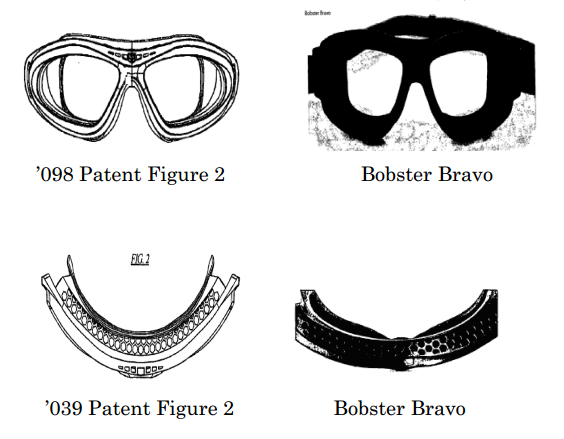
December 2012
In Patent Cases, Federal Circuit and Not Regional Circuit Standards Apply for Preliminary Injunction Likelihood of Success Test
| Judges: Newman (author), Clevenger, Linn |
| [Appealed from D. Vt., Chief Judge Reiss] |
In Revision Military, Inc. v. Balboa Manufacturing Co., No. 11-1628 (Fed. Cir. Nov. 27, 2012), the Federal Circuit reversed the district court’s denial of a preliminary injunction for utilizing an improper higher standard of proof in determining the plaintiff’s likelihood of success, and for improperly applying the design patent infringement “overall design” standard. The Court remanded for further proceedings in accordance with its opinion.
Revision Military, Inc. (“Revision”) and Balboa Manufacturing Company (“Balboa”) both design, manufacture, and sell protective eyewear for ballistic uses. Revision sued Balboa, claiming Balboa’s “Bravo” goggles infringed U.S. Design Patent Nos. D537,098 (“the ’098 patent”) and D620,039
(“the ’039 patent”), which covered Revision’s “Bullet Ant” goggles. Revision sought a preliminary injunction against Balboa to prevent the sale of “Bravo” goggles, which the district court denied. Revision appealed.
“Substantive matters of patent infringement are unique to patent law, and thus the estimated likelihood of success in establishing infringement is governed by Federal Circuit law.” Slip op. at 4.
The Court explained, however, that the determination of the likelihood of success in a patent infringement case “involves substantive matters unique to patent law and, therefore, is governed by the law of this court.” Id. (quoting Hybritech Inc. v. Abbott Labs., 849 F.2d 1446, 1451 n.12 (Fed. Cir. 1988)). Other circuit court precedent may apply in cases where the basis for a preliminary injunction is not the merits of an infringement charge. But where the preliminary injunction is based upon a substantive matter of patent law, Federal Circuit law applies. Accordingly, Revision did not need to meet the higher “clear” or “substantial” likelihood of success standard, but rather the Federal Circuit’s “more likely than not” standard. Id. at 4.
The Federal Circuit also disagreed with the district court’s application of the “overall design” standard for infringement of a design patent when determining Revision’s likelihood of success. Id. at 6. The district court correctly stated that the standard was whether the overall design was substantially the same in the eye of the ordinary observer. But it incorrectly went on to focus on particular features that “stand out as dissimilar,” such as the size and shape of the lenses, the concavity of the nose bridge, and the venting along the edge of the goggles. Id.

Id. at 5-6.
The Court held that while individual features may influence the determination of the overall design, the prior art context familiar to the ordinary observer should be considered. As stated in Egyptian Goddess, Inc. v. Swisa, Inc., 543 F.3d 665 (Fed. Cir. 2008) (en banc), the prior art acts as “a frame of reference” for the ordinary observer and is “therefore often useful in the process of comparison.” Id. at 677. The Federal Circuit concluded that the district court improperly ignored the prior art context in this case.
Accordingly, the Federal Circuit reversed and remanded with instructions to apply the correct “design-as-a-whole criterion” and the “more-likely-than-not standard,” properly considering the prior art frame of reference. Slip op. at 7.*Forrest A. Jones is a Law Clerk at Finnegan.